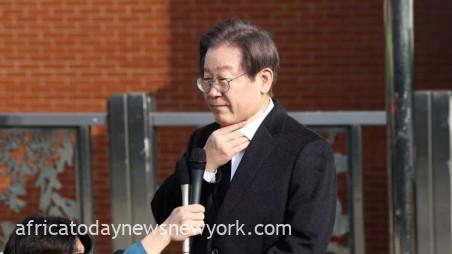After surviving a neck stabbing by an individual posing as a supporter, South Korean opposition leader Lee Jae-myung, upon his hospital discharge, calls for an “end to warlike politics.”
Surrounded by journalists in the southern port city of Busan on January 2, Lee Jae-myung, chair of the Democratic Party, faced an assailant who pushed through the crowd, stabbing him on the left side of his neck with a knife.
With a wound to his jugular vein, Lee Jae-myung was initially transported to a hospital in Busan and subsequently flown to the capital Seoul, where he underwent a nearly two-hour surgical procedure.
Eight days post-incident, 60-year-old Lee left Seoul National University Hospital, conveying to reporters that the attack should prompt a revamp of South Korea’s well-known confrontational political dynamics.
‘I sincerely hope this incident could serve as a milestone to end the politics of hatred and restore a politics of respect and coexistence,’ he said, his first public comments since the incident.
Read also: South Korea Officially Bans Dog Meat Trade With New Bill
‘I myself too will reflect on my deeds and strive hard to create politics of hope.’
Yonhap news agency reveals that the individual in question is a 66-year-old real estate agent, Kim, who grappled with financial difficulties, leading to a seven-month lapse in office rent payments.
The findings of the Busan police investigation into the case are slated to be revealed later on Wednesday, adding anticipation to the unfolding developments.
The safety of high-profile South Korean politicians has come into question in recent years, with multiple incidents of public attacks.
An elderly man hit Song Young-gil, who led the Democratic Party before Lee, in the head with a blunt object in 2022.
In 2006, Park Geun-hye, then the leader of the conservative party and subsequently president, faced a knife attack during a rally, leaving a lasting scar on her face.
Notoriously confrontational, South Korean politics has seen many former presidents prosecuted and incarcerated for corruption post-office, with a pattern of subsequent pardons.
The 2022 presidential race saw Lee’s loss to conservative Yoon Suk Yeol in South Korea’s tightest and most hotly contested electoral battle.
There is widespread speculation that Lee will vie for the presidency in 2027, and recent polls consistently highlight his robust standing as a contender.
However, his pursuit of the highest office is marred by a series of scandals, and he is currently confronting trial on bribery charges linked to a firm suspected of unlawfully transferring $8 million to North Korea.

